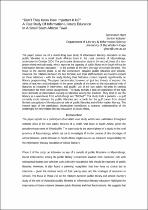“Don’t They Know How Important It Is?”
Abstract
The paper comes out of a month-long case study of information literacy education in two
public libraries in a small South African town in the rural province of Mpumalanga,
undertaken in October 2004. The participant observation study is the second phase of a twophase
mixed methods study, which explores the capacity of public libraries in South Africa for
information literacy education – in the context of the dire shortage of school libraries. The
focus in the second phase is on the connections between public libraries and schools.
However, the relations between the two libraries and their staff members are found to impact
on these relations - with the study finding that historical context impacts significantly on
library programming. The paper concentrates, however, on just two threads of enquiry: the
views of teachers and principals in the seven schools of the town on the educational role of
libraries as revealed in interviews; and pupils’ use of the two public libraries in seeking
information for their school assignments. The study reveals a lack of cognizance of the high
level demands of information-seeking in libraries among the teachers. They tend to see the
library as a warehouse from which things are “fetched”. The study finds a paradox – a gulf
certainly exists between the public libraries and schools but the gulf comes from shared
limited conceptions of the educational role of public libraries and of information literacy. The
intense gaze of the participant observation contributes a nuanced understanding of the
challenges for information literacy education in South Africa

